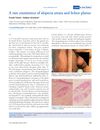 August 2021 in “Benha Journal of Applied Sciences”
August 2021 in “Benha Journal of Applied Sciences” Stress can trigger and worsen vitiligo.
[object Object]  July 2021 in “Dermatology archives”
July 2021 in “Dermatology archives” Methotrexate may effectively and safely treat hair loss in children, with notable improvement after 12-15 months.
 April 2021 in “HIV & AIDS Review”
April 2021 in “HIV & AIDS Review” Glycyrrhizinic acid spray showed limited effectiveness in treating anogenital warts in HIV patients with low CD4 levels.

Alopecia Areata has no cure, treatments are limited, and the condition often recurs, but new therapies like JAK inhibitors show promise.
 December 2020 in “bioRxiv (Cold Spring Harbor Laboratory)”
December 2020 in “bioRxiv (Cold Spring Harbor Laboratory)” Stress can cause a type of hair loss in mice lacking the CCHCR1 gene.
 March 2019 in “Nasza Dermatologia Online”
March 2019 in “Nasza Dermatologia Online” A man had both alopecia areata and lichen planus, which is uncommon.
 September 2018 in “The Medical Journal of Cairo University/The Medical Journal of Cairo University”
September 2018 in “The Medical Journal of Cairo University/The Medical Journal of Cairo University” Polarized light therapy helps hair regrowth in alopecia areata patients.
 September 2018 in “International Journal of Dermatology”
September 2018 in “International Journal of Dermatology” People with alopecia areata often have lower levels of zinc and vitamin D.
 January 2018 in “SOJ microbiology & infectious diseases”
January 2018 in “SOJ microbiology & infectious diseases” Etanercept, a psoriasis treatment, caused hair loss in a patient.
 January 2017 in “Postepy Dermatologii I Alergologii”
January 2017 in “Postepy Dermatologii I Alergologii” The CRH/CRH-R1 system might be involved in causing lichen planus.

Better models and evaluation methods for alopecia areata are needed.
 January 2017 in “Archives of clinical and biomedical research”
January 2017 in “Archives of clinical and biomedical research” Enhancing melanin's energy generation may help treat alopecia areata.
 December 2012 in “Journal of Dermatological Science”
December 2012 in “Journal of Dermatological Science” Estrogen increases a growth factor in hair cells which might affect hair loss.
 September 2016 in “Journal of the Egyptian Women's Dermatologic Society (Print)”
September 2016 in “Journal of the Egyptian Women's Dermatologic Society (Print)” Higher RBP4 levels found in people with two types of hair loss.
 165 citations,
September 2003 in “Toxicology and applied pharmacology”
165 citations,
September 2003 in “Toxicology and applied pharmacology” Blocking COX, especially COX-2, in the skin can reduce inflammation and pain and may help prevent skin cancer.
 124 citations,
October 2019 in “Frontiers in Immunology”
124 citations,
October 2019 in “Frontiers in Immunology” Janus kinase inhibitors are promising treatments for autoimmune skin diseases like eczema and psoriasis.
[object Object]  120 citations,
November 2014 in “Biological Reviews”
120 citations,
November 2014 in “Biological Reviews” The telogen phase of hair growth is active and important for preparing hair follicles for regeneration, not just a resting stage.
 86 citations,
June 2017 in “Anais Brasileiros de Dermatologia”
86 citations,
June 2017 in “Anais Brasileiros de Dermatologia” Antioxidants can benefit skin health but should be used carefully to avoid negative effects.
 69 citations,
August 2008 in “Journal of The European Academy of Dermatology and Venereology”
69 citations,
August 2008 in “Journal of The European Academy of Dermatology and Venereology” Oral dutasteride and topical pimecrolimus can safely and effectively treat Frontal Fibrosing Alopecia, leading to significant hair regrowth.
 58 citations,
October 2016 in “Journal of Investigative Dermatology”
58 citations,
October 2016 in “Journal of Investigative Dermatology” Activating Nrf2 protects human hair follicles from oxidative stress and helps prevent hair growth inhibition.
 47 citations,
March 2022 in “Frontiers in cellular and infection microbiology”
47 citations,
March 2022 in “Frontiers in cellular and infection microbiology” Changes in skin microbes play a role in some skin diseases and could lead to new treatments.
 41 citations,
December 2018 in “Experimental Dermatology”
41 citations,
December 2018 in “Experimental Dermatology” Understanding how melanocyte stem cells work could lead to new treatments for hair graying and skin pigmentation disorders.
 33 citations,
April 2011 in “Journal of Veterinary Internal Medicine”
33 citations,
April 2011 in “Journal of Veterinary Internal Medicine” Long-term fluticasone treatment does not harm the immune system in horses with heaves.
 32 citations,
December 2018 in “Cytokine”
32 citations,
December 2018 in “Cytokine” Type I interferons play a key role in the development of various skin diseases.
 27 citations,
December 2015 in “Clinical and Experimental Dermatology”
27 citations,
December 2015 in “Clinical and Experimental Dermatology” Diphencyprone helped most patients with alopecia areata regrow some hair.
 27 citations,
May 2007 in “Archives of dermatological research”
27 citations,
May 2007 in “Archives of dermatological research” Diphencyprone treatment increases CD8 lymphocytes in the scalp, which is associated with hair regrowth in alopecia areata patients.
 24 citations,
February 1987 in “Drugs”
24 citations,
February 1987 in “Drugs” Minoxidil promotes hair regrowth, but more research needed for effectiveness and response factors.
 22 citations,
June 2012 in “PLOS ONE”
22 citations,
June 2012 in “PLOS ONE” Cholesterol-related compounds can stop hair growth and cause inflammation in a type of scarring hair loss.
 22 citations,
April 2003 in “Eye”
22 citations,
April 2003 in “Eye” Applying latanoprost on skin can stimulate hair growth with minimal side effects.
 16 citations,
May 1998 in “International Journal of Dermatology”
16 citations,
May 1998 in “International Journal of Dermatology” Stress hormones like cortisol may trigger psoriasis flare-ups.






























